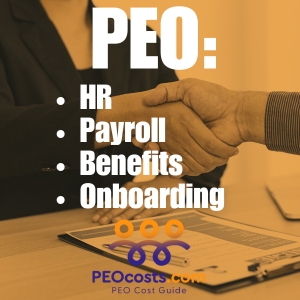
PEO For Small Business | Is It Right For You?
Unlocking the Power of PEOs for Small Businesses: An Expert’s Guide
As someone with extensive experience in entrepreneurship, financial management, and the intricacies of Professional Employer Organizations (PEOs), I’ve witnessed how these services can transform the way small businesses operate. If you’re a business owner striving to stay competitive, reduce operational burdens, and maximize resources, understanding the potential of a PEO is not just an option—it’s a necessity.
What is a PEO?
What exactly is a PEO? A Professional Employer Organization (PEO) is a company that partners with businesses to provide comprehensive HR solutions. This partnership is often called “co-employment.” While the business maintains control over its day-to-day operations, the PEO takes on many administrative responsibilities, including payroll, benefits, compliance, and risk management. This dual approach allows businesses to focus on growth and customer satisfaction while experts handle the complexities of HR.

The Strategic Advantage of PEOs for Small Businesses
Small businesses often lack the resources to build robust HR departments, navigate complex employment laws, or offer competitive employee benefits. This is where PEOs shine. By leveraging a PEO, small businesses can:
- Access Affordable Benefits
PEOs pool together employees from multiple companies to create a large workforce. This aggregation allows small businesses to access benefits typically reserved for large corporations, such as comprehensive health insurance, retirement plans, and employee perks. - Ensure Legal Compliance
Employment laws are ever-changing and vary by jurisdiction. Staying compliant can be a daunting task for small businesses, especially without dedicated HR experts. PEOs provide guidance and ensure adherence to labor laws, minimizing legal risks. - Streamline Payroll and Tax Administration
PEOs handle payroll processing, tax filings, and year-end reporting, reducing administrative burdens. This ensures accuracy and timeliness, helping avoid costly errors and penalties. - Mitigate Risk
PEOs often offer workers’ compensation insurance and support in workplace safety initiatives. Their expertise in risk management reduces the likelihood of incidents and provides a safety net when issues arise. - Attract and Retain Talent
In today’s competitive job market, employees seek companies that offer attractive compensation and benefits. Partnering with a PEO helps small businesses level the playing field, enabling them to attract top talent and foster employee loyalty.

Financial Implications: Cost vs. Value
One of the biggest misconceptions about PEOs is that they are expensive. While there is a cost associated with partnering with a PEO, the return on investment (ROI) often outweighs the expense. Consider the hidden costs of non-compliance, inefficient HR processes, and poor employee retention. PEOs not only mitigate these risks but also save businesses money by:
- Negotiating better rates on benefits.
- Reducing turnover through improved HR practices.
- Avoiding penalties from payroll errors or missed tax deadlines.
A PEO is not merely an expense—it’s a strategic investment in the longevity and efficiency of your business.
Selecting the Right PEO for Your Business
Not all PEOs are created equal. When evaluating potential PEO partners, consider the following factors:
- Accreditation and Certification
Look for PEOs accredited by the Employer Services Assurance Corporation (ESAC) or certified by the IRS. These credentials indicate financial stability and operational excellence. - Industry Expertise
Some PEOs specialize in specific industries. Choosing one with experience in your sector ensures they understand your unique challenges and can provide tailored solutions. - Service Offerings
Ensure the PEO provides the services your business needs, whether it’s benefits administration, compliance support, or HR technology. - Transparency
Review the PEO’s pricing structure and contract terms carefully. Transparent pricing and flexible agreements are critical to a successful partnership.
A Transformative Partnership
PEOs have revolutionized how small businesses manage HR and administrative functions. By partnering with a PEO, you’re not just outsourcing tasks—you’re gaining a strategic partner invested in your success. This partnership enables you to focus on what you do best: growing your business and serving your customers.
If you’re ready to explore the benefits of a PEO, start by assessing your business’s needs and researching reputable providers. Remember, the right PEO can be a game-changer, giving you the freedom to focus on innovation, growth, and the future of your business.

PEO for Small Businesses – 5 Common FAQs
1. What exactly is a PEO, and how does it work?
A PEO (Professional Employer Organization) is a service provider that manages HR-related tasks for small businesses through a co-employment relationship. This means the PEO becomes the “employer of record” for tax and legal purposes while you, the business owner, retain control over daily operations and employee management.
The PEO handles functions like:
- Payroll processing
- Employee benefits administration
- Workers’ compensation
- Compliance with employment laws
- Risk management
This arrangement allows small businesses to outsource time-consuming administrative tasks while focusing on growth and profitability.
2. How does a PEO help with employee benefits?
One of the greatest advantages of a PEO is its ability to provide small businesses with access to high-quality, cost-effective employee benefits. Because PEOs pool together employees from multiple businesses, they can negotiate better rates with insurance providers and offer benefits that might otherwise be unattainable for a small business, such as:
- Comprehensive health insurance
- Retirement plans (e.g., 401(k))
- Dental, vision, and life insurance
- Employee wellness programs
This access to robust benefits not only attracts top talent but also helps retain employees by enhancing job satisfaction.
3. Are PEOs expensive, and how is pricing structured?
PEOs charge for their services in one of two common ways:
- Percentage of Payroll – A fixed percentage of your company’s total payroll cost (usually between 2% and 12%).
- Per-Employee Fee – A flat rate per employee per month (ranging from $40 to $160).
While there is a cost involved, partnering with a PEO can save your business money in the long run by:
- Reducing HR overhead costs
- Avoiding fines and penalties from non-compliance
- Lowering turnover through better employee benefits
The key is to view a PEO as an investment that streamlines operations, improves employee satisfaction, and ultimately supports business growth.
4. How does a PEO ensure compliance with labor laws?
Employment laws are constantly changing and can vary by state or industry. Staying compliant is a significant challenge for small businesses. PEOs employ HR experts and legal professionals who monitor labor law updates and ensure your business complies with regulations such as:
- Fair Labor Standards Act (FLSA)
- Occupational Safety and Health Administration (OSHA) standards
- Family and Medical Leave Act (FMLA)
- State-specific wage and hour laws
By leveraging their expertise, PEOs help reduce the risk of non-compliance, which can result in fines, lawsuits, or reputational damage.
5. Is a PEO the right choice for my small business?
PEOs are an excellent option for small businesses that:
- Lack an in-house HR department or have limited HR resources.
- Struggle to attract and retain talent due to limited benefits offerings.
- Operate in industries with complex compliance requirements.
- Want to focus on growth without being bogged down by administrative tasks.
However, PEOs may not be suitable for every business. If your company has highly specialized HR needs or prefers complete control over all HR functions, a PEO might not align with your goals. It’s essential to evaluate your unique needs and research PEO providers thoroughly.
About the Author:
Michael Carr, PhD in Entrepreneurship and Financial Management, has over a decade of experience helping small businesses navigate operational challenges. As a trusted advisor on PEO services, Michael is passionate about empowering entrepreneurs to achieve sustainable growth through strategic partnerships.


